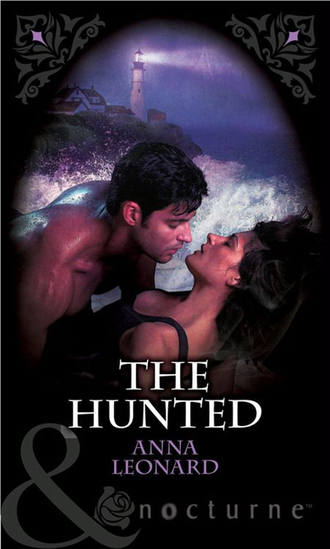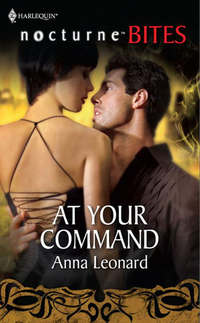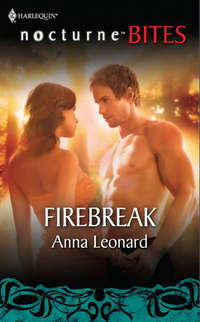
Полная версия
The Hunted
Beth’s practical streak failed her when it came to candles. These were handmade by a local craftswoman, lilac in color and scented with clean, crisp lavender and sea grass. Picking three of the candles off the shelf, along with a book of matches, she closed the closet door and went back downstairs to the main parlor. It had always been her favorite room, aside from the corner bedroom that had been hers all her life, and if the storm was going to go all night, then that was where she would wait it out.
One pillar went on the walnut coffee table, one on the plaster mantel over the fireplace and the third she positioned on the table next to the old cracked leather sofa. Using only one match to light them all, the room was soon bathed in a warm, comforting light. There was something about the flickering of candle flame that she adored; it didn’t fill the room the way artificial light did, but it seemed to illuminate better, somehow. The antiques in the room looked better in firelight: her great-grandfather’s spyglass; the rough but gorgeous little carvings of ivory that dated back to when whaling was the industry on this island; the handmade wooden ships her father had collected, three-and two-masters, all perfect down to the last detail, including the narrow boats lashed to their sides. Neither she nor Tal had ever felt the desire to play with them when they were children. They would watch them for hours, but never once had she taken one down other than to dust or display it for someone else. It was as though it was forbidden to look too closely, to ask too much, although her parents had never forbidden her or Tal anything of the sort.
Now, in the candlelight, she watched the shadows their masts and riggings made on the cream-painted walls, and felt some of her restlessness subside. Those boats were her inheritance, as much as this house; they told the story of her great-grandfather helping to build the fleets that used to ply these waters, her grandfather’s specialization in the carpentry of higher-end boats that put her dad through college, and her own dad’s fascination with boats that never seemed to translate into anything larger than those models. An entire family, tied to the shoreline without ever actually going out to sea. Beth suddenly wondered why she felt no particular draw toward boats, why Tal had actually gotten seasick the one time he went out on a fishing boat when they were in grade school. Maybe it was something genetic, and the further from their shipbuilding great-grandfather you got, the less you cared?
“Maybe it was just the storm,” she said. “Maybe I need a vacation. Get off the island for a little bit. Maybe go inland, see a forest or a mountain.” She had never gone more than a day’s travel inland; there were entire stretches of the country she had never seen except as the backdrop for movies on the television. Maybe she could get a passport, leave the country. See England, or Paris, or …
Her imagination failed her. She didn’t have a passport. She’d never been on a plane. She didn’t even watch the Travel Channel, for God’s sake. “Maybe it’s time to change all of that,” she said. “Do something different.”
A crack of thunder and a flash of lightning directly overhead sounded as though in answer.
“Fine, but is that a yes or a no?” she asked the ceiling, half expecting a reply. But the lights stayed off, the rain came down and no further electrical energy exploded overhead.
“Thanks for nothing,” she said, curling up on the sofa, her arms around her knees. Her attention was drawn, not to the shadows now, or even the fireplace, laid with wood already in case she wanted one last fire before warmer weather came in, but into the next room, where a plate-glass window looked out over the small front yard, over the tops of smaller Cape-style houses, down the road that led to the shoreline.
There were lights flickering outside, on the road heading toward the beach. Most of them were white headlights, but—she squinted—at least one or two were red. Cops. Or an ambulance.
There wasn’t anything she could do, if there had been an accident, either some idiot in a car, or a greater idiot in a boat. She had the basics of CPR, courtesy of a town-wide push last summer, but she wasn’t a paramedic or anything useful. There was nothing she could do at the scene other than clutter it up and get herself soaked. There was no reason she was extinguishing the candles, grabbing the flashlight, an oiled baseball cap and her raincoat, and grabbing the keys to her Toyota.
No reason at all. Except a sudden need to be there, to see what the storm had brought in.
The rain almost knocked her little car to the side of the road a time or two, but she got to the beach without disaster. The rain and clouds made it seem much later in the evening, closer to midnight than 8:00 p.m., and added to the unreality of the entire scene, to Beth. There were dark forms on the sand, over the dunes: people gathered, and a single vehicle with the red lights on top that marked it as belonging to the rescue squad.
Not an accident, then. Not a car, anyway. And no sign of wreckage that you’d expect, if someone were stupid enough to take a boat out with a storm coming in …
She parked and got out, startled by how noisy the rain was, once she was in it. Cold and hard, and even through her rain slicker she was quickly drenched. The cap kept the water off her face, but nothing more than that, and her hair stuck to her scalp unpleasantly.
“Get the stretcher over here!” a man’s voice yelled. “And you people, back off! You’d think you’d never seen a moron before.”
“Never one out of uniform” the retort came back from one of the bystanders, a woman. Beth slowed her steps a little. Obviously, whoever it was was still alive, and not in critical danger, if they were mouthing off over his body. Nobody here was quite hardened enough to crack jokes over a dead body. Something prickled on the back of her neck, like a spider walking there, or the unexpected touch of a warm hand. She flinched, and then looked around, feeling embarrassed, but there wasn’t anything but the crowd gathered, seven or eight people, including herself. And yet, somehow, the feeling remained, like some phantom hand rested just above her collar.
It wasn’t like her to spook at anything, much less nothing. After one last look around, she shrugged off the feeling and turned to the much more real scene in front of her.
“Evening, Beth.” The nearest dark form in rain hat and slicker turned out to be Mrs. Daley, who had taught seventh-grade math to Beth and her cousin, with variable success. She was in her sixties now, but still held students in thrall with a voice of steel and a heart of marshmallow.
“What happened?” Beth asked her.
“No idea. The call went out from the lighthouse about an hour ago—they spotted something in the water. So we came out to search.”
“We” in this case was the self-titled border patrol, a group of locals who came out when a whale or dolphin beached itself, or a ship got into trouble, or any other crisis requiring a pair of hands and a strong back. Mrs. Daley was a charter member.
“And found …”
“One body, male.” Mrs. Daley leaned in, laughter in her voice even if Beth couldn’t see her face clearly in the dusk and rain. “Nude.”
“Mrs. Daley!” Beth had to laugh, and immediately felt bad about it. “He’s all right, though?”
The older woman nodded. “Out cold, but doesn’t seem to be anything wrong with him. In any sense of the word. Spoilsport Josiah had to go and throw a blanket over him, though. Poor boy. I hope there wasn’t anyone else out there with him.”
Beth assumed that she meant the stranger, not Josiah. “A boat wreck, then?”
“Well, what else could it be, wash him up here, a night like tonight? No debris, that anyone’s seen, but you think he was just out for a casual swim? In that water?”
The Atlantic Ocean was not a gentle body of water, even in summer. It was only spring now, which meant that the water was still too cold for anyone but the most fervent polar bear or long-distance swimmer to be out in it. Although you never knew what someone from Away, a non-Islander, might do; people came here and did stupid things, all the time. Usually in tourist season, though.
Beth felt that prickle again, this time all down her spine, and she shivered. Not a warm hand this time; more like the sleek dark shadow of something swimming in the deep waters below her.
The crowd parted, and she could see that the paramedics were loading him onto the stretcher now. Drawn by the same urgency that got her down there, Beth moved forward, needing for some reason to see the face of this stranger.
“Miss, stay back, please.” She didn’t know the paramedic; he must have been new. Not that she knew everyone in town—it was small but not that small—but almost everyone was on nodding basis with everyone else.
That thought put the words in her mouth. “I … want to make sure I don’t know him.”
It wasn’t totally a lie. She did want to make sure of that. She didn’t think there was a chance in hell she did know him, but it worked; the paramedic moved aside just enough for her to see the guy’s face in the light of the emergency vehicle’s headlights.
Pale skin, even allowing for shock and being washed out under those flashing red lights. Clean-shaven, with broad, strong cheekbones. Masculine, without being heavy or brutish. The light flickered, highlighting reddish glints in thick black hair so much like hers—there was a moment of shock, and Beth felt her knees almost give out under her.
“Ma’am?” The paramedic was right there at her elbow. “Do you know him?”
That moment of concern allowed her to get close enough to touch the stranger, the flesh of one arm outside the blanket, wet from seawater and rain, cold but not dead-cold, just wet-cold.
“No.” Her breath came back in a rush, and her heart started beating again. No, it wasn’t Tal. It wasn’t her cousin, dead and buried and not haunting her because he would never have been cruel enough to do that. Just some guy with hair the same color and texture his had been, like hers, that was all. Coincidence.
And the look of this guy said he was closer to her age, maybe in his early thirties at most, than Tal’s fifteen when he died. Beth swallowed and forced herself to look again. The features were different, too, now that she could see him more clearly. Tal had been blessed with the family nose, a sort of turned-up snub, and his skin had been darker, his coloring inherited from his Italian father, not the pale-as-flounder Havelock line. This stranger was pale like that, like she was, and his nose was longer, narrower, his mouth wider, the chin more stubborn, and without the five-o’clock shadow that Tal got, even as a teenager.
She touched the stranger’s arm again, driven by an urge that she didn’t understand, and something sparked under her fingers, making her shiver again from something other than the cold.
Something clicked. Something changed, here and now. Chemicals collided in her bloodstream, stars aligned, a wave crested and fell, and she was never going to be the same again.
Beth shook her head, refusing the sense of portent overwhelming her. She didn’t believe in that sort of thing—she was tired, that was all. Tired enough to swear that the guy was shimmering in the rain, that his skin was overlaid with something, some kind of.
A second layer, almost. The kind that she used when she was retouching photographs, to blank out details she didn’t want to use in the final product or distract the eye from things that couldn’t be repaired.
Beth blinked, then wiped at her eyes with the back of her hand. Humans couldn’t be retouched. She was probably running a fever to go with her cold; that would explain it. She needed to get the hell out of the rain, get her overtired imagination under control.
“No,” she said again, backing away before she could touch the body again. “I don’t know him.”
They bundled the stretcher into the ambulance and pulled away slowly over the sand, lights flashing but the siren off. The crowd started to drift away, and Beth drifted with it, back to the house. She shed her raincoat and sneakers just inside the door, then peeled off her sodden jeans and sweater as well, and walked through the house in damp panties and socks. The main bathroom upstairs was old-fashioned enough to still have the original claw-foot tub, and she started the water running hot while she stripped off her socks and underwear and added scented bath salts to the water. Hair piled on top of her head, she sank gratefully into the steaming, sweet-smelling water up to her shoulders and felt her body finally let go of the rain’s chill. She reached up with her toes and managed to shut the tap off before the water reached a dangerously overfull level. Her muscles softened, her eyes closed, and only some remnant of awareness kept her from falling asleep in the tub. When the water cooled enough to rouse her, she hauled her body out of the tub, dried off and put on warm flannel pajamas and slid into bed. The moment her damp head hit the pillow, she was asleep, dreaming of deep green waves, briny air and the slide of warm, warm hands along the inside of her legs and up across her stomach, lingering in places that made her smile in her sleep, as she turned to embrace her pillow as though it were a lover.
Chapter 2
He woke slowly, surfacing with a sense of panic blunted by something soft and sticky.
There was dark and a sudden shock of pain, and … nothing. He opened his eyes, his lashes gummy and stuck together, and discovered that he was in a bed. He knew it was a bed, although he hadn’t slept in one since he was a child, preferring a hammock that mimicked the motion of the waves.
A bed. In a place he didn’t recognize, filled with smells he didn’t recognize.
There were no windows wherever he was, only a single narrow doorway. White surrounded him, white sheets and walls, and shiny metals and plastics and that overwhelming smell of something that made his nostrils flare in distrust and disgust.
Cleansers, part of his brain reminded him. To clean up the shit and the blood. You’re in a hospital.
He had been in one of those, long ago. His sister had torn open her leg on a rusty nail half-submerged off a dock, and she’d had to go to the mainland and have it stitched up. As her favorite sibling, her only brother, closest in age, he had gone with her and their mother, to keep her calm while the doctors did their thing. There had been the same smells, and shots, and the adults had all been annoyed but not really worried.
That was good. Annoyed but not worried meant this was an inconvenience, not a threat. Hospitals were where they helped you. What was this hospital helping him for? What had he done to himself? Nothing hurt, nothing felt wrong … It annoyed him that he couldn’t remember.
“Good morning.”
He turned his head and looked up at a man who was pushing back the curtains and moving to stand beside the bed. An older man, maybe even Elder. Gray hair and beard; the latter was cut into a sharp point on his chin, like a shark’s fin. But the eyes were pale blue and kind.
“Morning,” he responded, his voice raspy, like he’d been yelling. Maybe he had. He couldn’t remember even that much.
“I don’t suppose you could tell me your name?”
He could. He could remember that. But it wouldn’t mean much to this man, his name and colony-connection, identifying him as seal-kin. Nothing this human male could understand. An instant of panic flooded his brain, and then another name came to him from memories of long ago, names and connections to the land …
“Dylan.” He coughed, spoke again more firmly, confidence coming back to him with the memories. “My name’s Dylan. Dylan … Meridith.”
“Excellent.” The man took a thin instrument out of his white coat’s pocket and flicked it on, a narrow beam of light coming from one end. Dylan obediently let him flick the light into one eye and then the other, relieved when the man—a doctor?—grunted in satisfaction and turned the light off. “Look this way, please? And that way. Excellent. No headache? Very good. Lie back now, and relax. You gave us all quite a scare, Mr. Meridith, washing up like that. Usually by the time the Atlantic gets done with bodies, they go to the morgue, not the emergency room.”
He had been swimming, that was right. Heading for shore. Looking …
Looking for his mate. Yes.
Dylan lay back on the pillow, the memories returning now. Bypassing the other colonies to come here, to where humans lived, this arm of land jutting out from the mainland. Swimming, endlessly swimming: so focused that he ignored the warning signs of the storm, when he should have known better. The storm came. Waves knocking him over, being bumped by something, losing consciousness.
And waking up here.
“I. You found me on the sand.” It wasn’t a question; he remembered that, vaguely. Voices and lights, things being done to his body, bringing his temperature back up. He owed those people his life. “Thank you.”
“You’re welcome. Although I had the easy part, just waiting for you to wake up.” He smiled, and the kind blue eyes sparkled with life and humor. “I’m Dr. Alden, by the way, and I’m the one who says when you get to go home. But first, we need to know where home is, exactly.”
Dylan froze. The name he’d given the doctor had been placed in his memory years ago, just in case, but he hadn’t thought of what to say about his home. He hadn’t even thought to think about it.
He trusted this Dr. Alden, instinctively. Despite that, his voice caught before any words escaped. You never told where the colony was. You never betrayed the kin living there. That was the first training seal-kin got, when they first went out among the human-kin. It was too dangerous.
Sometimes, following instinct was good. Sometimes, it was not so good. What was he supposed to do?
Another flash of memory: someone talking over him, something about debris, looking for debris, of … a boat?
“Daughter of the Sea,” he said, buying time with whatever came to mind. “My boat. Is it okay?”
Since there wasn’t any such boat, he wasn’t horribly crushed when Dr. Alden sadly told him that there was no sign of his boat anywhere, not even debris. But it gave him enough time to come up with a story that would get him out of this hospital.
Because he remembered something else from the night before, after the feel of sand under his face and being wrapped in blankets and bundled into a vehicle. He remembered a warm voice, and a cool hand on his skin, and the reaction he’d had, even mostly unconscious, to her presence.
A woman. The woman he had come to find.
She was here.
He had come to the right place, after all. The sea had not betrayed him.
Dr. Alden excused himself and disappeared beyond the curtains, leaving Dylan to sink into the hard comfort of his bed. She was here.
And with that thought, the urgency returned, a wave that would have knocked him over were he not already lying down. Instead, it sent him bolt upright.
He had to find her. Now.
“Where do you think you’re going, young man?”
The doctor appeared next to him, a firm hand on his arm. Dylan would have protested except that he feared, if the human let go, he would fall on his face like a weanling denied milk.
“You said I was fine.”
“I said you hadn’t suffered any permanent damage. That’s not fine. You were badly dehydrated, battered, and unless I miss my guess, your muscles aren’t responding very well to commands even now.”
“I’ll be fine. I …” This doctor had eyes like Dylan’s grandfather: wide-set, sky-blue and gentle, but still able to see through any lie you might even think about telling. “I mean no disrespect, sir. I know that you mean well. But I don’t like being indoors, especially in a medical facility. I’d do better if I could find a place with …with windows, at least.”
“Humph.” The doctor’s gruff voice didn’t match the understanding in those eyes, and Dylan felt himself relax, even as the older man ushered him back onto the bed.
“I’ll tell you what. You let me run a few tests, make me feel better about turning you out into the street, and I’ll sign off on your discharge papers today. Deal?”
Dylan nodded. “Deal.”
Part of the test involved giving up quantities of his blood, and breathing into a strange device of three tubes with small balls inside. Dylan amused himself by making all three balls rise and fall in unison, until Doctor Alden admitted that his lungs were in excellent shape and took the device away. Then, he had to walk the length of the clinic—ten beds and two exam rooms—without faltering.
A glimpse out the one window in the hallway, a single clear pane of glass, reassured him that he was not far from the sea—set on a rise of land, the clinic looked over rooftops toward the wide expanse of water. Dr. Alden left him there, staring out at the horizon, while he went off to do whatever it was that doctors did. Soon enough the nurse came by and shooed him back to his bed, where a pair of dark blue pants, a white shirt and cheap white sneakers waited. “Your clothing didn’t survive your wreck,” she said apologetically. “We had to guess at your size and the color choices were, well, limited.”
“Thank you.” He had left home so quickly, without thinking anything through, he hadn’t even thought about clothing. Or money. Oh, hell.
He dropped the simple robe and reached for the jeans. The nurse let out a noise that was a cross between a giggle and a squeak, and left him to get dressed.
“So.” Dr. Alden appeared without fanfare as he was lacing up the shoes. “No dizziness? No last-minute headache to crash your escape plans?”
“I’m good?” Dylan waited with bated breath for the answer.
“You’re annoyingly good. If all of my patients healed up as quickly as you did, I’d be out of business and have to find honest work.”
The nurse walking by snickered quietly, then ducked her head when the doctor mock-glared at her. “You can see that I get no respect at all, already.”
Dylan wisely stayed out of the argument. At home, females outnumbered males 3:2 and bossed the younger males around mercilessly, giving way only when males reached what his mother called “the interesting age.” That snicker had sounded reassuringly familiar to a man who grew up surrounded by sisters.
“All right. Yes, you get your walking papers, and consider yourself a lucky son of a bitch. Try to keep on top of the water, not under it, from now on?”
Dylan merely smiled and took the papers the doctor handed him, scrawling something on the line for his own signature. His people spent almost half their lives riding underneath the waves. But he appreciated the concern.
Dr. Alden put his own signature on the papers that made his release official and tucked them into his clipboard. “There you go. I want you to check in with your own doctor when you get home, though, just to be on the safe side. All right?”
“I had actually planned on staying in town for a little while,” Dylan admitted. “It seems like a nice place. From the little I saw of it last night.”
Dr. Alden laughed. “Watery and dark, you mean. It is a nice enough place, yes. We avoid the worst of the tourist invasion, and I certainly like it here, but I can’t imagine there’d be much to keep you occupied, unless you’re here for the beach or the views. Still, if you’re going to stay, welcome to you. And feel free to stop by if anything at all feels odd or uneasy.”
“I will. Ah.” Dylan suddenly felt awkward again. Free. Nothing in the human world was free, and he had no money. Nothing at all, except. The weight on his ankle was a sudden, reassuring shock—the anklet, a gift from his sister years before, was so familiar he had forgotten it was there. He could sell that, maybe. Sell it, and settle his debt.
“Don’t worry about it, young Dylan.” Dr. Alden’s eyes were kind again. “Men who show up stark naked on our beach, and don’t immediately ask for a phone to call their family? We don’t expect you’re going to pull out a platinum card. Fortunately, you weren’t exactly a financial burden, not needing much more than a bed and treatment for mild dehydration and exhaustion.”







